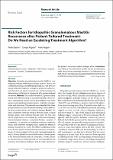DSpace Repository
Risk Factors for Idiopathic Granulomatous Mastitis Recurrence after Patient-Tailored Treatment: Do We Need an Escalating Treatment Algorithm?
- DSpace Home
- →
- Web Of Science
- →
- Web Of Science
- →
- View Item
JavaScript is disabled for your browser. Some features of this site may not work without it.
| dc.contributor.author | Pelin Basim
|
|
| dc.date.accessioned | 2024-03-25T10:37:48Z | |
| dc.date.available | 2024-03-25T10:37:48Z | |
| dc.date.issued | 2022 | |
| dc.identifier.issn | 1661-3791 | |
| dc.identifier.issn | 1661-3805 | |
| dc.identifier.uri | http://hdl.handle.net/11547/11416 | |
| dc.description.abstract | Objective: Idiopathic granulomatous mastitis (IGM) is a rare, relapsing, benign inflammatory breast disease. Due to the conflicting etiology and differential diagnosis, the effect of varied treatment regimens on high recurrence is controversial. Therefore, we aimed to report our clinical experience in determining risk factors for recurrence after patient-tailored treatment. Methods: This study evaluated 122 patients diagnosed with IGM according to sociodemographic characteristics, reproductive history, clinical presentation, time of diagnosis and radiological examinations, treatment management, and outcomes. The patients were classified into three groups based on curative treatment settings: medical therapy alone, surgery alone, and combined therapy. Results: The rates of patients receiving medical therapy alone, surgical therapy alone, and combined therapy were 23, 15.6, and 62.4%, respectively. Low vitamin B-12 levels, accompanying rheumatological disease, complaints-fistulae, number of complaints >= 3, presence of erythema nodosum, multicentricity, and treatment modality had a significant effect on disease recurrence (p < 0.05). The effect on IGM recurrence was 2.8 times greater for the patients with lower vitamin B-12 levels, 4.5 times greater for those with rheumatological disease, 3.3 times greater for those with fistulae, 2.4 times greater for those presenting with >= 3 complaints, 2 times greater for the presence of multicentricity, 2.3 times greater for the presence of erythema nodosum, and 4.5 times greater for the patients receiving medical therapy alone. Conclusion: Describing a low-risk patient profile can be an alternative while choosing monotherapy methods. For IGM patients at high risk of recurrence, an escalating treatment system may be effective in preventing relapses. | tr_TR |
| dc.language.iso | en | tr_TR |
| dc.relation.ispartofseries | 17;2 | |
| dc.subject | CORTICOSTEROID-THERAPY | tr_TR |
| dc.title | Risk Factors for Idiopathic Granulomatous Mastitis Recurrence after Patient-Tailored Treatment: Do We Need an Escalating Treatment Algorithm? | tr_TR |
| dc.type | Article | tr_TR |
Files in this item
This item appears in the following Collection(s)
-
Web Of Science [1152]
